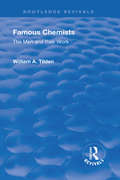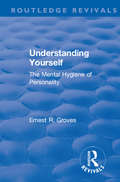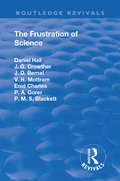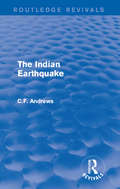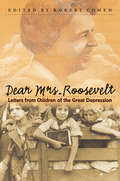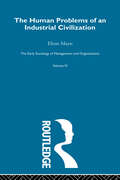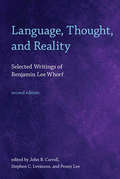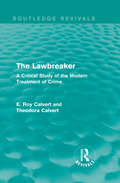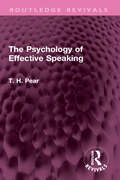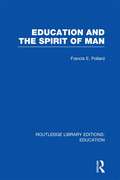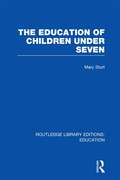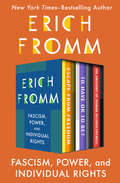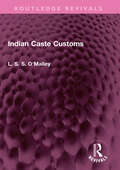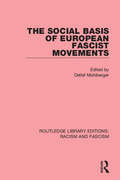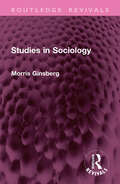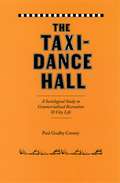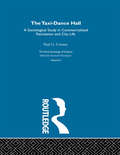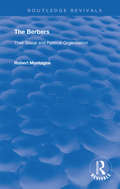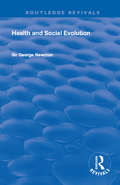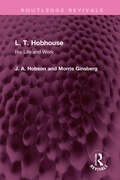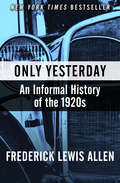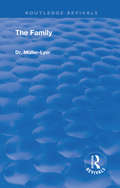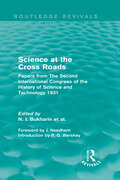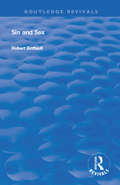- Table View
- List View
Revival: The Men and Their Work (Routledge Revivals)
by William A., TildenThe present volume is an attempt to skitch, in a style suitable for general reading, the lives of some of the most prominent chemists of the past. As it is obviously impossible for one person to deal with them all, the first great difficulty in such a project is to make the selection. After much reflection, the guiding principle adopted is the evolution of the Atomic Theory from the point of view of the Chemist.
Revival: Understanding Yourself: The Mental Hygiene Of Personality (1935) (Routledge Revivals)
by Ernest R. GrovesThis book has a practical purpose. It seeks to help the reader to understand himself and his problems, that he may increase his successes, his fruit, and his satisfactions. The discussion centers about the conditions that shape personality, but the attempt of the book is not to rehearse the findings and theories of science but to provide the means by which the reader can come to a better understanding of himself.
Revival: The Frustration of Science (Routledge Revivals)
by Alfred Daniel, HallFrom the beginning to the end of these pages, whether we read of the wilful destruction of the products and productivity of the soil, the aerial destruction of wealth by the thousand million pounds’ worth, created by somebody’s labour, the embarrassing fecundity of modern technology resulting only in every conceivable form of sabotage, the anomalous position of the conscientious medical practitioner. The refusal of women to bring children into such a world, the development of the art of spreading bacterial infection as a new war technique, or the frank abandonment by modern political movements of the hope of social progress that science renders possible – from the beginning to the end of these pages the reader will find elegant examples of the sort of ruling mentality now dominating the world. Bitter, and justifiably so, as many of the critics of science are, surely nothing bitterer could be said of it than this, that its abundance has but enthroned the wastrel. Not is the solution exactly what one of the contributors rather naively suggests, that science should look for a new master. The solution is for the public to acknowledge its real master, and, for its own safety, insist on being ruled not by the reflection of a reflection, but direct by those who are concerned with the creation of its weather rather than of its debts. It should require that its universities and learned societies should no longer evade their responsibilities and hide under the guise of false humility as the hired servants of the world their work has made possible, but do that for which they are supposed in cultured release from routine occupations, and speak the truth though the heavens fall.
Routledge Revivals (1935): A Plea for Understanding
by C.F. AndrewsFirst published in 1935, this book provides a comprehensive overview of the 1934 Nepal-Bihar earthquake, giving a background to the earthquake zone, describing the event itself and surveying the ensuing devastation. The author also looks at the government’s actions and the response of India’s other states as well as the religious and social dimension to the reaction — exemplified by Mahatma Gandhi. The book examines how the earthquake was compounded by a severe flood that occurred shortly before, how preparations for the monsoon season were made in an attempt to limit further destruction and the subsequent recommendations for more earthquake resistant urban planning.
Dear Mrs. Roosevelt
by Robert CohenImpoverished young Americans had no greater champion during the Depression than Eleanor Roosevelt. As First Lady, Mrs. Roosevelt used her newspaper columns and radio broadcasts to crusade for expanded federal aid to poor children and teens. She was the most visible spokesperson for the National Youth Administration, the New Deal's central agency for aiding needy youths, and she was adamant in insisting that federal aid to young people be administered without discrimination so that it reached blacks as well as whites, girls as well as boys.<P><P> This activism made Mrs. Roosevelt a beloved figure among poor teens and children, who between 1933 and 1941 wrote her thousands of letters describing their problems and requesting her help. Dear Mrs. Roosevelt presents nearly 200 of these extraordinary documents to open a window into the lives of the Depression's youngest victims. In their own words, the letter writers confide what it was like to be needy and young during the worst economic crisis in American history.<P> Revealing both the strengths and the limitations of New Deal liberalism, this book depicts an administration concerned and caring enough to elicit such moving appeals for help yet unable to respond in the very personal ways the letter writers hoped.
The Human Problems of an Industrial Civilization (Early Sociology Of Management And Organizations Ser.)
by Elton MayoIn this volume Mayo discusses the Hawthorne experiments, relating the findings about human relations within the Hawthorne plant to the social environment in the surrounding Chicago area. The Chicago School of Sociologists were studying aspects of social disorganization and this was a topic pioneered by Emile Durkheim.
Language, Thought, and Reality, second edition: Selected Writings of Benjamin Lee Whorf
by Benjamin Lee WhorfWritings by a pioneering linguist, including his famous work on the Hopi language, general reflections on language and meaning, and the "Yale Report."The pioneering linguist Benjamin Whorf (1897–1941) grasped the relationship between human language and human thinking: how language can shape our innermost thoughts. His basic thesis is that our perception of the world and our ways of thinking about it are deeply influenced by the structure of the languages we speak. The writings collected in this volume include important papers on the Maya, Hopi, and Shawnee languages, as well as more general reflections on language and meaning.Whorf's ideas about the relation of language and thought have always appealed to a wide audience, but their reception in expert circles has alternated between dismissal and applause. Recently the language sciences have headed in directions that give Whorf's thinking a renewed relevance. Hence this new edition of Whorf's classic work is especially timely.The second edition includes all the writings from the first edition as well as John Carroll's original introduction, a new foreword by Stephen Levinson of the Max Planck Institute for Psycholinguistics that puts Whorf's work in historical and contemporary context, and new indexes. In addition, this edition offers Whorf's "Yale Report," an important work from Whorf's mature oeuvre.
The Lawbreaker: A Critical Study of the Modern Treatment of Crime (Routledge Revivals)
by E. Roy Calvert Theodora CalvertThe early 21st century saw better prison conditions and a lower imprisonment rate however public worry over supposed increasing violent crime as perpetuated by the media in the 1930’s led to a return to harsher sentences and fuller prisons. Originally published in 1933, The Lawbreaker analyses British penal methods of the time and of the past to discover the most effective ways to treat prisoners and reduce crime as well as identifying where more research is needed to obtain a balance between punishment and rehabilitation. This title will be of interest to students of Criminology and Sociology.
The Psychology of Effective Speaking (Routledge Revivals)
by T. H. PearFirst published in 1933, The Psychology of Effective Speaking studies voice as an expression of personality. This book also criticises the education of its time, but not always destructively. It asks why, since people speak, they should not speak better. It suggests that if democracy is to succeed, rapid increase in the effectiveness of vocal communication is urgently necessary, and that this improvement begin in the lower classes of the schools. This book will be of interest to students of rhetoric, communication and psychology.
Education and the Spirit of Man (Routledge Library Editions: Education #151)
by Francis PollardThis volume was the Swarthmore Lecture for 1932, one of an annual series of lectures delivered by and for members of the Society of Friends (Quakers). The lecture discusses the place of education and moral philosophy in the world of the early twentieth century, as well as the place of religious discipline in education.
The Education of Children Under Seven (Routledge Library Editions: Education)
by Mary SturtThis book does not cover the whole field of Infants’ Teaching but is concerned mainly with general principles and matters which are open to the non-specialist. Some technical subjects such as Physical Education have been omitted but nonetheless the volume provides a thorough (if somewhat dated) introduction to early years education in the first half of the twentieth century.
Fascism, Power, and Individual Rights: Escape from Freedom, To Have or To Be?, and The Anatomy of Human Destructiveness
by Erich FrommThree fascinating examinations of the psychology of political power from the New York Times–bestselling author of The Art of Loving. Philosopher and social theorist Erich Fromm is renowned as “a psychologist of penetration and a writer of ability” (Chicago Tribune). In these three riveting works, Fromm sheds light on some of the most critical dilemmas facing humanity. Escape from Freedom: Though freedom has been a prized value in Western culture for centuries, it is often accompanied by feelings of anxiety and powerlessness. Fromm’s compelling study demonstrates how these feelings of alienation can lead to a desire for conformity and authoritarianism, bringing invaluable insight into the rise of Nazism and fascism in Europe. To Have or To Be?: Life in the modern age began when people no longer lived at the mercy of nature and instead took control of it. Fromm argues that through the process of modern materialism, the natural tendency of humankind moved away from practicing human abilities, and instead focused on possessing objects. Humankind therefore began using tools that replace our own powers to think, feel, and act independently. Fromm argues that positive change—both social and economic—will come from being, loving, and sharing. The Anatomy of Human Destructiveness: This classic study makes a distinction between animal aggression and certain forms of destructiveness that can only be found in human beings. His case studies span zoo animals, necrophiliacs, and the psychobiographies of notorious figures such as Hitler and Stalin, offering a comprehensive exploration of the human impulse for violence. This ebook features an illustrated biography of Erich Fromm including rare images and never-before-seen documents from the author’s estate.
From Homer to Helen Keller: A Social and Educational Study of the Blind
by Richard Slayton French<P>From Homer to Helen Keller, Homer stands for the greatest achievement of the blind in the times antecedent to their systematic education. He stands for all those bards, many of them blind or blinded, creators of literature and makers of our language, who through ballads, always of great vigor and sometimes of surpassing beauty, have handed down to us the glorious traditions of far-off heroic times. <P>Miss Keller stands for the supreme achievement of education. The blind claim her, but the deaf can claim her, too, and modern education can claim her more than either--and all humanity claims her with the best claim of all. For she is the epitome of all that is best in humanity, all that is most spiritual; and all this through conscious aim and directed effort, through education in its best sense.
Indian Caste Customs (Routledge Revivals)
by L. S. O'MalleyFirst published in 1932, Indian Caste Customs is an explication on how caste system operates in everyday life. What are its injunctions and prohibitions? What actions constitute offences against its moral law and social honour? What are the means by which breaches of that code are adjudicated? What are the penalties inflicted on offenders? The book attempts to answer these questions as well as discuss the merits and demerits of the caste system in India. This book will be of interest to students of history, sociology, anthropology and South Asian studies.
The Social Basis of European Fascist Movements (Routledge Library Editions: Racism and Fascism)
by Detlef MühlbergerBetween 1919 and 1945 most countries in Europe spawned some form of fascism. Some have become considerably more notorious than others: this book, first published in 1987, sets out to analyse the social forces that went into the making of the fascist parties of the major European countries and to show the similarities and differences in their constitution as well as to suggest reasons for their different degrees of penetration and success. Few books have surveyed the whole field; the team of contributors engaged in the present enterprise offer a systematic and thorough survey of the social characteristics of European fascist movements, a subject of central importance to social and political history.
Studies in Sociology (Routledge Revivals)
by Morris GinsbergFirst published in 1932, Studies in Sociology consists of essays that fall into three groups, the first concerned with the scope and method of sociology and its relation to history and social philosophy; the second devoted to an analysis of the theory of evolution as applied to society, and to a number of problems in social psychology, such as the nature of social purpose, the place of instinct in social science, the relation between instinct and emotion, and the inheritance of mental characters; while the third group deals with the claims of Eugenics, and social classes and social mobility. This book will be of interest to students of sociology, history and philosophy.
The Taxi-Dance Hall: A Sociological Study in Commercialized Recreation and City Life
by Cressey Paul G.First published in 1932, The Taxi-Dance Hall is Paul Goalby Cressey’s fascinating study of Chicago’s urban nightlife—as seen through the eyes of the patrons, owners, and dancers-for-hire who frequented the city’s notoriously seedy “taxi-dance” halls. Taxi-dance halls, as the introduction notes, were social centers where men could come and pay to dance with “a bevy of pretty, vivacious, and often mercenary” women. Ten cents per dance was the usual fee, with half the proceeds going to the dancer and the other half to the owner of the taxi-hall. Cressey’s study includes detailed maps of the taxi-dance districts, illuminating interviews with dancers, patrons, and owners, and vivid analyses of local attempts to reform the taxi-dance hall and its attendees. Cressey’s study reveals these halls to be the distinctive urban consequence of tensions between a young, diverse, and economically independent population at odds with the restrictive regulations of Prohibition America. Thick with sexual vice, ethnic clashes, and powerful undercurrents of class, The Taxi-Dance Hall is a landmark example of Chicago sociology, perfect for scholars and history buffs alike.
The Taxi-Dance Hall (The\making Of Sociology Ser.)
by Paul G. CresseyFirst published in 2003. This is Volume II of eight in the Early Sociology of Culture collection and offers a sociological study on the commercialized recreation. Paul G. Cressey while serving as a case-worker and special investigator for the Juvenile Protective Association was requested during the summer of 1925 to report upon the new and then quite unfamiliar closed dance halls. This book is in a sense the outgrowth of those assignments.
The Berbers: Their Social and Political Organisation (Routledge Revivals)
by Robert MontagneOriginally published in 1931 and re-editioned in 1973, this book presents Robert Montagues findings about the Berber world, providing a major contribution to the understanding of Islam and of Africa. Students of pre-industrial civilisations and of tribal societies alike, as well as anyone concerned with the Middle East or Africa, will welcome this text.
Health and Social Evolution: Halley Stewart Lectures, 1930 (Routledge Revivals)
by George NewmanOriginally published in 1931, this book explores the history of health and social evolution in the UK, including chapters on how England learned to control disease, the contribution of the eighteenth century, and the coming of democracy.
L. T. Hobhouse: His Life and Work (Routledge Revivals)
by J. A. Hobson Morris GinsbergFirst published in 1931, L. T. Hobhouse is an amalgamation of the late social philosopher L. T. Hobhouse’s personal life and academic work. The first part of this volume is a brief biography by Mr. J. A. Hobson, with added impressions by personal friends and colleagues. It is followed by an account of his philosophy and sociology written by Professor Morris Ginsberg, his pupil and successor at the London School of Economics. Third section consists of some collected essays illustrative of his various capacities and interests. This book will be of interest to students of philosophy and sociology.
Only Yesterday: An Informal History of the 1920s (Perennial Classics Ser. #Vol. 12)
by Frederick Lewis AllenHailed by the Washington Post as "the one account of America in the 1920s against which all others must be measured," Frederick Lewis Allen's extraordinary social history takes readers back to a time of flappers and speakeasies, the first radio, unparalleled prosperity--and cataclysmic economic decline Beginning November 11, 1918, when President Woodrow Wilson declared the end of World War I in a letter to the American public, and continuing through his defeat, Prohibition, the Big Red Scare, the rise of women's hem lines, and the stock market crash of 1929, Only Yesterday, published just two years after the crash, chronicles a decade like no other. Allen, who witnessed firsthand the events he describes, makes the reader feel like part of history as it unfolds. This bestselling, enduring account brings to life towering historical personages including J. Pierpont Morgan, Henry Ford, Sigmund Freud, Albert Einstein, Al Capone, Babe Ruth, and Jack Dempsey. Allen provides insightful, in-depth analyses of President Warren G. Harding's oil scandal, the growth of the auto industry, the decline of the family farm, and the long bull market of the late twenties. Peppering his narrative with actual stock quotes and breaking financial news, Allen tracks the major economic trends of the decade and explores the underlying causes of the crash. From the trial of Nicola Sacco and Bartolomeo Vanzetti to the inventions, crazes, and revolutions of the day, this timeless work will continue to be savored for generations to come.
Revival: The Family (Routledge Revivals)
by Franz Carl Muller-LyerThis book is a sociological study of the institution of marriage in all its possible forms and a discussion of family and of kinship. What were marriage and the family in the "dim red dawn of man"? How have they changed and evolved? What is their probable future? This clear and comprehensive book, written by a leading sociologist, answers these questions with a wealth of material, from a thoroughly modern point of view, and without traditional prejudices.
Science at the Cross Roads: Papers from The Second International Congress of the History of Science and Technology 1931 (Routledge Revivals)
by N. I. Bukharin et alThe papers given by the Soviet Delegation to the Second International Congress of the History of Science and Technology in London in 1931, headed by N. I. Bukharin, exerted a profound influence on Western historiography of science. Perhaps the most influential contribution was that of Hessen, who made a long and classical statement of Marxist historiography, taking Isaac Newton as his example. The collection, which appeared in Britain at the height of the Depression, fostered an acute social awareness and a heated debate among many working scientists. Accredited by some as "the starting point of a new evaluation of the history of science", the book reflects the huge social and economic divide between Socialism and Capitalism present at the time of publication, and its influence on intellectual culture and scientific advancement.
Sin and Sex (Routledge Revivals)
by Briffault RobertOriginally published in 1931, Sin and Sex, including an introduction from Bertrand Russell, constitutes an able and vigorous attempt on the part of Robert Briffault to induce his readers to base their ethical opinions upon something other than the prejudices of the average members of the last generation.
